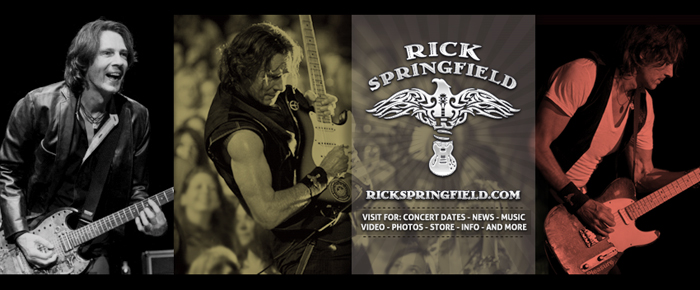
On Jessie’s Girl, Battling Depression, 30 Years of Marriage, and over 50 Years of Music
By Lisa Morgan
“I actually thought there were better songs on the album than Jessie’s Girl. It was back when radio stations and DJ’s could play what they wanted. They all started playing ‘Jessie’s Girl’ and it hadn’t even been released as a single. I can thank the radio DJs of the world for the success of that record.”
Thus began my conversation with the first 80s pop/rock star to win my heart and wear out the double A batteries in my Walkman. With the slightest remnant of an Australian accent, the unpretentious, two time Grammy winner, shared openly about the triumphs and struggles that have spanned his 50 plus year career that is still going, still thriving today.
Rick’s love for music began to build steam around the age of 13. “We lived out in the country, in Australia. We didn’t have a TV for the first 9 years of my life. We had a piano. My dad would sing and we’d all join in. That was our entertainment at night. There was always music going on around the house. Eventually, I discovered pop music and then, of course, the guitar. Once you fall in love with the guitar, it’s pretty much a life sentence.”
When his military father was stationed in England, Rick joined various bands and others when they returned to Australia. At 20, he became a member of the pop rock group Zoot from 1969 to 1971. He began his solo career with his début single Speak to the Sky, and it reached the top 10 in Australia. He was only 22 years old when he made the career move to the United States. When asked if he felt intimidated or nervous about that decision, Rick responded, “Not really. It was a bit overwhelming when I first arrived, but it had been my focus for a couple of years. All the bands around were going to England. I’d already been to England as a kid, so I thought I’d try going to America. It was tougher to get in to than England. In England you can just go straight in. In America, I had to write to the Mexican Embassy, the Canadian Embassy; I was even thinking, ‘Maybe I can sneak across the border’. I had no way of knowing how I was going to get in, but I was determined. Finally, I hooked up with some guys who brought me over on a record deal. It seemed like the obvious next step for me.”
Rick and his label ran into a bit of controversy shortly after arriving in America in ’72 when some radio DJs boycotted his music. “They accused my manager of sending busloads of kids to the record store to buy my single, “Speak to the Sky”, which was a hit at the time. It wasn’t us, but we got hit with that. Believe me, with the stuff that was going on in the record companies back then, that was nothing,” he laughed. “There were hookers, drugs and money…. Now it’s a completely different animal. Unless you’re the top 3 of a record company, it’s really not worth being on a label. There’s so much to do independently. It’s a drag that the record industry has gotten as screwed up as it is, but the internet has opened up whole new areas. The peer to peer thing was the way people used to hear music anyway, back in the old days, and it’s kind of gotten back to that. I think if it’s good music, it gets out there.”
Rick is also is an accomplished actor with a comprehensive list of roles on television film and even Broadway. In 1981, shortly after signing with RCA and recording the album Working Class Dog, Rick accepted the role of Dr. Noah Drake on the daytime drama, General Hospital. Neither Rick nor his agent expected the album to do very well, but the song “Jessie’s Girl” went to number one, and for the next two years, Rick simultaneously played the role while touring with his band. The two complimented each other, boosting the show’s ratings and record sales. I asked him if he had a favorite acting role. “I like the edgier roles,” he shared. “It’s a lot more fun than playing ‘type’.” Rick referred specifically to his part on the hit series, Californication wherein his first appearance was as a “twisted version of myself…a hedonistic Rick Springfield” from the past.
In 2010, with 25 million records sold, 17 top-40 hits, as well as a 1981 Grammy for Best Male Rock Vocal for his No. 1 hit single “Jessie’s Girl”, Rick wrote his autobiography, Late, Late at Night. The publication entered The New York Times best-seller list at No. 13, and Rolling Stone named it one of the top-25 rock autobiographies of all time. Rick knew he had an interesting story to tell, but as for its potential he said, “I wasn’t sure how the writing of it would be taken. It’s like a song; you throw it out there, and you don’t really know if it’s good or really crappy until you get another perspective. The reaction was great, and I was really thrilled to make Rolling Stones top 25 rock and roll auto biographies of all time. That’s such a narrow group. And having written it myself, without a ghost writer, it really encouraged me to write more. So I did and we’ll see what happens in May. I have my first novel coming out in May called, “Magnificent Vibration” and I’m really excited about that. I used to write as a kid, mainly horror stories, and then songwriting took over.” When I asked Rick, of all the things he has done, if he had to pick only one, what would it be? Rick easily responded, “I love the whole aspect of writing, both songs and prose, because I can do that anywhere, sitting in my kitchen or on the plane.”
In reading Rick’s autobiography, one is immediately confronted with his lifelong battle with depression. “It has been constant in my life. The teen years were pretty terrible. Actually, my autobiography starts out with me trying to hang myself at around the age of 17. I didn’t know what it was. I was just really down. Depression wasn’t really identified back then. I didn’t really start hearing about it until the late 70s, early 80s. It got pretty tough again in the mid 80s when I was pretty successful and realized success wasn’t going to heal anything. That was a big downer. I went to therapy and took time off from 1985 to 1990 to try and figure out what was going on with me. It was a really instructive time. Any time you spend in therapy with a good therapist, you learn things. Certainly, as a writer, depression is a great driver. You look in to yourself. If you’re happy, you don’t say to yourself, ‘Why am I so happy?'”, he chuckled. “When there are problems, you look in and ask, ‘Why am I so depressed?’ Hopefully, then, there are insights.”
I asked Rick if he had any advice for others suffering. “It’s so different for everybody,” he said thoughtfully. “Everybody is in different stages of it. Meditation really helped me. I try to keep looking forward, keeping in mind that all things pass. It’s impossible for things to stay the same. Everything changes. I’ve known people who have successfully (or unsuccessfully) ended their lives. Not having been that far, I can say it isn’t an answer. It’s kind of a pause button. Our job is to stay on task and figure out how to cope and find the positive side. My positive side is it drives me as a performer and it’s responsible for whatever depth I have in my writing.”
I asked if he had ever considered being anything else besides a musician and getting a ‘day job’, he shared, “There was a point, at a really difficult time, when I was being asked to leave school and I looked through the want ads. I didn’t know how to do anything else. The only job I really had was when I was 15 years old, watering plants. That was only for about 3 months. There was no drive that made me think I could do that for the rest of my life.”
Married with two children, Rick shared his theory on keeping his family life together in an industry where his successful, 30 year marriage is a rare accomplishment. “The secret? I married my wife. She’s unbelievable. It’s all a battle though. Our friends who have been together as long will tell you, it’s all a battle. It’s just not something where you get to coast along. My best advice? The only way to stay married is to not get divorced.”
Rick recently received his second Grammy Award along with Dave Grohl, Paul McCartney and the rest of the Sound City Players, Producers and Engineers for BEST COMPILATION SOUNDTRACK FOR VISUAL MEDIA for the 2013 soundtrack to Sound City: Real To Reel. Springfield teamed up with Dave Grohl (of bands Nirvana and Foo Fighters) on the Sound City project. The project encompassed a documentary, an album, and the Sound City Players tour as well as a string of critically acclaimed shows with fellow documentary subjects including Stevie Nicks, Trent Reznor, John Fogerty and Lee Ving. The duo co-wrote The Man That Never Was, inspired by a true story from World War II, and has been recognized by critics as one of the best songs on the Sound City album. Rick shared that working with Dave Grohl “was great.” He went on to say, “He is really a very open musician, loves music and is very talented, not to mention, the guy is a blast to hang out with. We wrote our song for Spin City in a day and a half – that was a new experience for me. The whole band was fabulous.”
Rick is currently touring extensively both with a full band and in more intimate settings, as a solo act. The Coachella Valley will be enjoying the music of Rick Springfield with a full band at Fantasy Springs Resort Casino on Sunday, February 16th at 8pm. Tickets are still available and may be purchased online at www.fantasyspringsresort.com or call 800-827-2946.
Fans can follow Rick and his many endeavors at rickspringfield.com










































